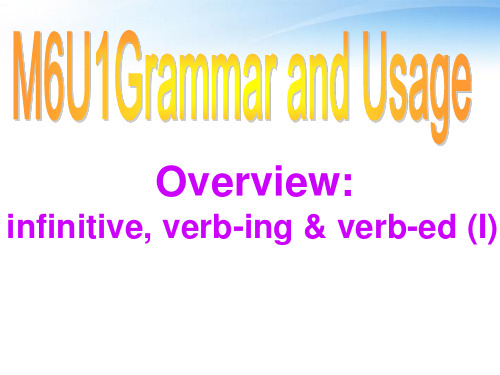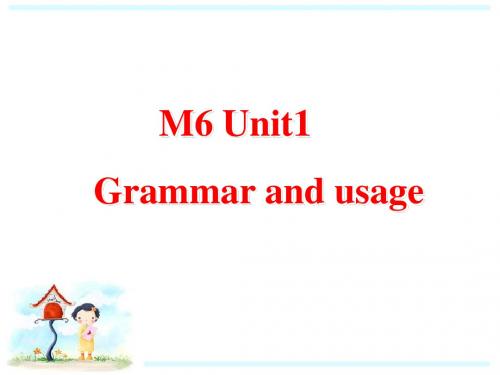译林牛津版模块六 unit1 非谓语语法
高中英语M6U1非谓语动词复习课件(I)牛津版选修6

have/make/see sb. do sth. (宾补) →sb. be made to do sth. (主补)
II. 只能跟do (不含to的不定式) 作宾补的动词 1. 感官动词 (记忆口诀)
一感: feel 二听: hear, listen to (全过程) 三让: let, make, have… 四看: see, watch, notice, observe(全过程)… 2. 使役动词have/make/let(等)sb. do sth. III. 分词作宾补 1. have/make/let/get/see/hear(等)
they were nowhere ___C____.
A. to find
B. to have found
C. to be found
D. being found
(三)宾语补足语
The boy wanted to ride his bicycle in the
street, but his mother told him __A____.
B. in order to receive
C. so as to be received
D. so as to be receiving
* 现在分词作状语时, 其逻辑主语必须与句子 的主语相同; 如果不相同, 分词前必须加上 自己的主语, 这种结构被称为独立主格结构。
E.g.
The moon appearing, we began to set off.
D. write in
2. She said she had a important meeting
__B___.
译林牛津版高中英语模块六: unit 1 laughter is good for you 非谓语动词 课件 (共17张PPT)

现在分词与不定式作结果状语的比较
1.(2012· 天津高考)He got up late and hurried to his office, ________ the breakfast untouched. C A.left B.to leave C.leaving D.having left 2.(2012· 山东高考)George returned after the war, only ________ A that his wife had left him. A.to be told B.telling C.being told D.told
规律总结:
• 现在分词表示自然而然的结果;不定式表示意想不到的结 果,其前常加only。试比较: • ①More highways have been built in China, making it much easier for people to travel from one place to another. • 中国又建了更多的公路,这使得人们出行变得更加容易了 • ②I arrived at the station in a hurry, only to find the train had left. • 我匆忙到达车站,结果却发现火车已经开走了。
Hale Waihona Puke 特殊情况: * 现在分词作状语时, 其逻辑主语必须与句子 的主语相同; 如果不相同, 分词前必须加上 自己的主语, 这种结构被称为独立主格结构。 E.g: The moon appearing, we began to set off. If time permits, I will stay for another week. =_______________, Time permitting I will stay for another week.
译林牛津版高中英语Module 6 Unit 1 Grammar and usage---非谓语动词教学课件 (共18张PPT)

__结__果___状语
Step 2 Change the sentences
状语从句------Ving
1. As soon as they heard the bell, they rushed out of the room .
They walked out of the building, talking
and smiling.
They walked out of the building and they
talked and smiled.
伴_随__/_方__式_状语
原因? 条件?时间?结果?让步?伴随/方式?
Preparing carefully, he still couldn't
• Even though he faces so much difficulty, he never gives up.
Facing so much difficulty, he never gives up.
• When he heard the good news, he became very excited.
• Even though he faces so much difficulty, he never gives up.
Facing so much difficulty, he never gives up.
• When he heard the good news, he became very excited.
Present Participle as Adverbial
现在分词作状语
Step 1 functions
译林牛津版高中英语Module 6 Unit 1 Grammar and Usage ---非谓语动词教学课件教学课件(共38张PPT)

2.笑能帮助你的身体保持健康。 L_a_u_g_h_i_nghelps your body (_to_)_k_e_e_p_h_e_a_lt_h_y_.
Practice _____ is my favorite
after-class activity.
1.犯错误对孩子来说是很自然的。
V ? + 宾语 + to do ask, tell ,want, advise, order, warn, inspire, expect, get…
V ? + 宾语 + do/doing
After-class study
Find out more such verbs and bear them in mind.
extraordinary.
(6)O__v_e_r_c_o_m__i_n_gcountless difficulties leads you to
success.
Giants rise above fear. Triumph(战胜) over pain.
To be a giant, push themselves and inspire others
It isPnraatucrtailcfoer childrento__m__a_k_e_m__is_t_a_k_e_s_.
II2tt.i你sivs这er么iymk做pin真odr是otfa太yno好tu t了_fo_o。d_r_o_ms_o_e___. _____.
句型:It is + adj + (for/of sb) to do 句型:It is no use/good doing 句型:It is worth doing
译林牛津版高中英语Module 6 Unit 1 Grammar and Usage ---非谓语动词教学课件 (共19张PPT)

Sum up
常接非谓语做宾语补足语的情况: 1. 感官动词如: see, watch, observe, hear,
notice等。 2. 使役动词如:have, get, make, let等。 3. leave, find, keep, with等复合结构。
3. _N_o_t_h_a_v_i_n_g_r_e_c_e_iv_e_d__ her reply, she decided to write again. (not receive)
难点三:分词的被动式在句中的 不同用法
1. _B_e_in__g_e_x_p_o_s_e_d_ (expose) to the sun for a long time will do great harm to our skin.
3. So many people _b_e_i_n_g_ (be) absent, we decided to put the meeting off.
Homework
1. Consolidate what we leaneபைடு நூலகம் today.
2. Finish the exercises on the paper.
2. Once visited, the city will never be forgotten. → 相当于Once the city is visited… 3. Encouraged by his parents, he still has no confidence in overcoming the difficulties. → 相当于Although he is encouraged by…
译林牛津版高中英语Module 6 Unit 1 grammar and usage 非谓语动词之不定式 (共24张PPT)

The next time you feel upset or disappointed, do not worry. _E_n_j_o_y_in_g (enjoy) a funny comedy or _re_a_d_i_n_g_ (read) some jokes will drive away your negative feelings and make you feel much better.
It is + adj. + (for sb.) to do But in the pattern “It is no use/ no good doing” we use “doing”
as the subject. eg. It is no use copying all the words down.
2.The box wrapped in colored paper looks strange.
• The movie to be issued next month is said to be very interesting.
• The book published last month is an interesting one.
It is no good arguing with him.
Compare the sentences and find out the difference between “v.-ed” and “v.-ing” as attributives.
1.The case belonging to Tom looks very strange.
To see is to believe. Laughing helps your body stay healthy and can even help you fight pain.
苏教牛津译林高中英语模块6_Unit1_语法点睛:非谓语动词用法
语法点睛:非谓语动词用法v .-ing 形式作宾语、宾语补足语一、v .-ing 形式作宾语1.跟v .-ing 形式作宾语的动词(短语)有:enjoy ,admit ,avoid ,escape, consider(考虑),finish, delay, put off, give up, advise, suggest, dislike, mind, miss, practise, risk. appreciate 等。
I enjoy watching TV . What about you?我喜欢看电视,你呢?The doctor suggested his giving up smoking.医生建议他戒烟。
【提示】 v .-ing 形式作某些动词的宾语时,如果还带有宾语补足语,须先用it 作形式宾语,而把v .-ing 形式放到宾补之后。
常见的词有:find ,feel ,consider 等。
He feels it no use telling her about it.他觉得告诉她这件事情是徒劳无益的。
2.有些动词后既可接动名词作宾语,也可接不定式作宾语,但在意义上有很大差异。
⎩⎨⎧ go on doing sth.继续干同一件事go on to do sth.接着干另外一件事⎩⎨⎧ stop doing sth.停止干某事stop to do sth.停下来去干另一件事⎩⎨⎧ forget doing sth.忘记干了某事forget to do sth.忘记要干某事⎩⎨⎧ remember doing sth.记得已经干了某事remember to do sth.记住要干某事⎩⎨⎧try doing sth.尝试着干某事try to do sth.企图、尽力干某事⎩⎨⎧ mean doing sth.意味着干某事mean to do sth.打算干某事;想去干某事⎩⎨⎧ can't help doing sth.禁不住干某事can't help to do sth.不能帮助干某事⎩⎨⎧regret doing sth.后悔干了某事regret to do sth.因要做某事而遗憾二、v .-ing 形式作宾语补足语1.以下动词后可用v .-ing 形式作宾语补足语:see ,hear ,watch, find, get, keep, notice, listen to, look at, leave, catch 等。
牛津译林高二英语选修六学案Unit1-2非谓语动词Word缺答案
高二英语语法非谓语动词(不定式动名词分词)第一节不定式一.形式①带to的不定式(to do sth , to be done , to be doing sth , to have done sth, to have been done )②不定式的否定式not to do二.作用(一)作主语To know something about English is one thing and to master English is quite another.To lose heart means failure.不定式做主语时常用it作形式主语It’s one thing to know something about English and it’s quite another to master it.It means failure to lose heart.又如It is difficult /easy/possible/impossible/necessary… for sb. to do sth.It is kind/careful/careless/selfish/clever/cruel/considerate….of sb. to do sth.(二)做宾语①在一般动词后作宾语(常见以下动词+to do作宾语)只跟动词不定式作宾语的动词决心学会想希望(decide/determine, learn, want, hope/wish/expect/long)拒绝设法愿假装(refuse, manage, care, pretend)主动答应选计划(offer, promise, choose, plan)同意请求帮一帮(agree, ask/beg, help)外加afford和strive (努力), fail, happen, would like/loveNobody could refuse to help the child who lost his parents in the earthquake.I don’t think he meant to hurt you.注意:当不定式短语作宾语时,若后面有宾补,则用形式宾语it代替to doI consider it better not to go out.He has made it a rule to get up early in the morning.All these worries made it impossible (for her) to concentrate on her work.②介词宾语I had no choice but to wait for him.更多情况下不定式做介词短语,一般用疑问句+to do 的结构。
英语必修Ⅵ牛津译林版Unit1语法课件(共21张)
2. 若作定语的不定式是不及物动词, 或者及 物动词与被修饰的词不能构成动宾关系 时,则不定式动词后须加上适当的介词。 eg: 他正在找房子住。 He is looking for a house to live in.
现在分词与过去分词, 不定式作定语的区别 ①过去分词做定语与其修饰词之间是动宾关系 或过去分词表示的动作已完成。 ②现在分词作定语表示动作正在进行,与修饰词 是主谓关系。 ③不定式作定语表示将要发生的动作。
M6 U1 Grammar and usage
Overview: infinitive, verb-ing and verb-ed
非谓语动词是指在句子中不作谓语的 动词不定式 动词,主要包括_______________, verb-ing ______________, _________________ verb-ed形式 。
• 1.不定式/动名词做表语用通常是解释主语的内 容的。主语和表语可以互相交换。 • Eg. My job is to teach you English.=To teach you English is my job. • My job is teaching you English.=Teaching you English is my job. • 2.现在分词做表语说明主语的特征,通常表示: 令人….的,含有主动意义。 • Eg. 这个年老的教授的课堂太无聊了。 • The old professor’s lecture is too boring.
being built now (正在被建的) the house to be built next year (将要被建的) built last year (建好了的 )
1. With all the problems___________( solved solve), everyone felt rather relaxed. learn 2. You don’t have to make Paul __________(learn) do French. He is made to _____(do) too many things. 3. How could you keep such a little boy _____________(work ) so long ? working 4. I need this chapter_____________ rewritten (rewrite) before tomorrow. 5. On seeing the superstar, she felt her heart ___________ beating (beat) fast. 6. When playing football, Jack had his leg ___________(break). broken
译林牛津版高中英语Module 6 Unit 1 Grammar and Usage ---非谓语动词教学课件教学课件 (共18张PPT)
动名词
do)
(doing)(doing)
现在分词 (doing)(doing)
过去分词(done)(done)
意义
形相往容当往词于有味、将名副词来词意、,相 常当性于、习名作词惯性,的指动经
相当于形容词、副 词,往往有现在意
味
相当于形容词、副词, 本身兼有被动、完成意
义
充当句子成分 主表定语语语、、、宾宾状语补语、 、主语、宾定语语、表语、表语、状宾语补、定语、表语、宾补语、定语、状
不及物动词 主动语态
一般式 完成式
praising having praised
being praised having been
praised
coming having come
三、动名词的句法作用
1. 作主语:为保持句子平衡,可用it作形式主语,而将 动名词短语放在句末,其逻辑主语泛指人们。 Working all day made her tired. It’s no use crying over spilt milk.
2. 作定语:动名词作定语起修饰作用,用于说明名词 的用途和目的,且只能放于所修饰词的前面。 It is important to use a good learning method.(a method of learning) The man sitting at the working desk(a desk for writing) is a young writer.
2. 作表语时Байду номын сангаас动名词作表语,具有名词性质,说明主语 的内容或情况;分词作表语,相当于形容词,表示性质 和状态。 His hobby is fishing.(动名词) His speech was inspiring.(现在分词)
- 1、下载文档前请自行甄别文档内容的完整性,平台不提供额外的编辑、内容补充、找答案等附加服务。
- 2、"仅部分预览"的文档,不可在线预览部分如存在完整性等问题,可反馈申请退款(可完整预览的文档不适用该条件!)。
- 3、如文档侵犯您的权益,请联系客服反馈,我们会尽快为您处理(人工客服工作时间:9:00-18:30)。
having done
being done/to be done/having been done
1. _N_o_t_k_n_o_w__in_g_(not know ) how to do it, he turned to Mr. Li for help.
__H_a_v_i_n_g__b_e_e_n__t_a_u_g_h_t__(teach) many times, he still can't understand this question.
V.___?___+ doing/(to) do/done
(1). I have persuade himt_o__a_p_o__lo__g_iz_e_(apologize)
waiting
called upon to read his or her paragraph aloud.
VIII. Consolidation
用所给动词的适当形式填空: (每空不限一词)
When I was little, Friday night was our family game night. After supper, we would play card games of all sorts in thes_i_tt_in_g_(sit) room. As a kid, I loved to watch cartoons, but no matter how many times I askedt_o_w__a_tc_h(watch) them, my parents would not __le_t__(let) me. They would say to me that p__la_y_in_g (play) card games would help my brain. Still I was unwillingt_o_p_l_a_y(play) the games with them sometimes. I _d_id_n_'_t_r_e_a_li_ze_ (not realize) how right my parents were until I entered high school. The games_t_a_u_g_h_t(teach) by my parents when I was a child turned out t_o_b_e_ (be) very useful later in my life.
M6 U1 Grammar and usage
I. Revision
• 1. 什么是非谓语动词? • 2.非谓语动词的三种形式:
三种形式
doing done
用法
表主动,表进行 表被动,表完成
to do
表目的,表将来
II. Lead-in
找出下列谚语中的非谓语动词并翻译该谚语。
1. It's never too late t_o__le_a_r_n__.
Mother____b_e_in_g__(be) ill, I had to stay at home looking after her.
2.分析该非谓语动词表示的动作与主句谓语动作 发生的时间先后关系。
_H_a_v__in_g__w__ri_t_te_n__(write) his composition, he went to have a heart-to-heart talk with Mr. Wang.
VII.非谓语动词在短文改错中的考查:
1. (2018全国卷I No.77)
My grandpa said last summer they earned quite a
lot by s_e_l_l the fish.
selliቤተ መጻሕፍቲ ባይዱg
2.. (2018全国卷III No.72)
Everyone was silent, _w_a_i_t to see who would be
to be watered (5). We're having our car_r_e_p_a__ir_e_d_ (repair). (6). It is no good_d_o__in__g(do) nothing all day long.
VI.非谓语动词在语法填空中的考查:
1. (2018全国卷 I No.62)
十年树木,百年树人。
• 5. Well b__e_g_u_n_/ A good _b_e_g_i_n_n_i_n_g_ is half _d_o_n_e_ .
良好的开端是成功的一半。 • 6. It's no use c_r_y_i_n_g over _sp__il_t milk.
覆水难收。
III. 非谓语动词的否定式、完成式及被动式:
According to a review of evidence in a medical journal, runners live three years longer than nonrunners. You don't have to run fast or for long__t_o_s_e__e_ (see) the benefit.
1.确定是否需要非谓语动词。(连词、谓语动词) 然后分析出该非谓语动词的逻辑主语,并判断其 与其逻辑主语之间是主动还是被动关系。
(1)._H__e_h_a__d_b__e_e_n__to_l_d_ many times, b_u_t he still couldn't understand it. (tell) (2).H__a_v_i_n_g__b_e_e_n__to__ld__ many times, he still couldn't understand it. (tell) (3).The girl _w__ri_t_in_g_(write) a letter there can
2.H_a_v_i_n_g_f_in_i_s_h_e_d_(finish) my homework, I went out for a walk .
3._B_e_i_n_g__re_p__a_ir_e_d__(repair) now, the car can’t be used .
IV. 非谓语题答题技巧
to you.
(2). Add some wood to keep the fire_b_u__r_n_i_n_g_
(burn).
(3). I didn’t mean_t_o__a_r_g_u_e_ (argue) with you. (4). The flowers need w__a_t_e_r_in__g_/(water).
2.(2018全国卷III No.64,65)
I quickly lower myself, ducking my head to avoid_lo__o_k_i_n_g_ (look) directly into his eyes so he doesn't feel_c_h_a_l_le__n_g_e_d_ (challenge).
活到老学到老。
2. S_e_e_i_n_g_ is b__e_li_e_v_i_n_g_. /T__o_s_e_e_is t_o__b_e_l_ie_v_e_.
眼见为实。
3. T_o__o_p_e_n_ a book is always beneficial.
开卷有益。
• 4. It takes ten years _to__g_r_o_w__trees, but a hundred t_o__r_e_a_r people.
speak English very fluently.
(4).Time _p_e_rm__i_tt_in_g___(permit), we will go camping next week. (独立主格结构)
独立主格结构: 名词或代词+doing/done/to do/形容词短语/名词
短语/介词短语/副词短语 (当该非谓语动词的逻辑主语与句子的主语不一致 时,需在其前加一个逻辑主语)
2018年全国卷 II 短文改错
